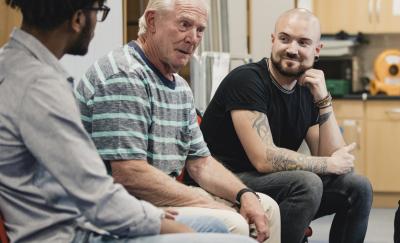
2020 Rx Drug Abuse & Heroin Summit
In light of the changing public health situation around COVID-19, the Rx Summit will be held virtually.
There is no single solution to the opioid crisis. Over the years, Abt has taken action to help federal, state, and local agencies and other stakeholders prevent opioid misuse, recognizing that partnerships and collaborations are critical if we are to save lives. We approach the opioid epidemic with a multidisciplinary lens, using rigorous methods and data analysis to connect the evidence and help our clients develop effective, sustainable solutions.
Our experts are looking forward to joining the 2020 Rx Drug Abuse & Heroin Summit virtual conversation.
POSTER PRESENTATIONS:
Together is Better: Shared Medical Appointments for Treating Patients with Chronic Pain and/or Opioid Use Disorder in Primary Care
Authors: Wesley Sargent, Ed.D., CDC; Laura Heesacker, LCSW, Jackson Care Connect; Nida Corry, Ph.D., Abt Global; Erin Massey, LCSW, Clearwater Valley Hospital and Clinics
Opioid Management Improvements in Primary Care Clinics: Insights from Practices and Clinical Staff
Authors: Sarah Shoemaker-Hunt, Ph.D., Pharm.D.; Leigh Evans, Ph.D.; Holly Swan, Ph.D.; Olivia Bacon, Caroline Kupersmith, Abt Global
Insights and Impact

Abt Team to Research Management of Older Adults' Opioid Use
Rockville, Md. – The Agency for Healthcare Research and Quality (AHRQ) has awarded an Abt Global-led team a $3.28 million contract to identify and test strategies for management of opioid use and misuse in older adults in primary care practices. The work expands Abt’s AHRQ, opioid and primary care portfolio.Under the four-year contract, the Abt team will assess and describe the field of opioid use, misuse and opioid use disorders in older adults. Contrary to trends among younger Americans, opioid misuse has increased among older Americans in recent years.The Abt team will analyze secondary data sources, including AHRQ’s Healthcare Cost and Utilization Project, perform an environmental scan, and conduct a national survey of geriatric primary care providers. In addition, the team will develop a compendium of strategies and support two sequential 15-month learning collaboratives of primary care practices. The team will provide support during the implementation and testing of the compendium of strategies developed from the environmental scan.The project will produce a publicly available compendium and information products such as peer-reviewed publications and infographics or case studies to enable primary care providers to offer older adults better pain management and opioid treatment.Abt’s partner is Kaiser Permanente Washington Health Research Institute in Seattle.“Older adults have injuries and chronic conditions that often leave them in great pain,” notes Rosanna Bertrand, Ph.D., an associate in Abt’s Division of Health and Environment. “They often need pain medication but are vulnerable to adverse reactions due to their metabolism, physiology, comorbidities, and drug interactions. Primary care providers need to know best practices for opioid management to mitigate against the risks for older adults.”Read more about the project.About Abt GlobalAbt Global is an engine for social impact, dedicated to moving people from vulnerability to security. Harnessing the power of data and our experts’ insights, we provide research, consulting and technical services globally in the areas of health, environmental and social policy, technology and international development. http://www.abtglobal.comContact: Stan Crockstan_crock@abtassoc.com(301) 347-5402

Abt Study Cites Five Promising Approaches to Jail Diversion For People With Mental Health and Substance Use Disorders
Rockville, Md. – People with behavioral health conditions such as serious mental illness and substance use disorders, including opioid-use disorder, are three- to six-times more likely than the general population to be involved with the justice system. Without coordinated intervention, they risk cycling in and out of the mental health, substance use and criminal justice systems, a costly cycle that undermines recovery.But a new study from Abt Global for the Department of Health and Human Services’ Office of the Assistant Secretary for Planning and Evaluation offers important insights on state and local pre-booking jail diversion programs serving this population. They show promise that they can help break the cycle of justice involvement for people with these conditions and get them the services they need. The pre-booking jail diversion programs studied included:ANGEL Program, Gloucester, Mass.Drug Abuse Response Team (DART), Lucas County, Ohio.Homeless Outreach Team (HOT), Wichita, Kan.Mental Health America Nebraska (MHA-NE) Respond Empower Advocate Listen (REAL).Oakland Community Health Network (OCHN), Oakland County, Mich.All of the programs rely on cross-system collaborations and most use community policing strategies.“Many individuals with substance use and mental health conditions can wind up in the justice system, which impacts recovery and has costs to the community,” said Abt’s Sarah Steverman, project director of the study. “As communities grapple with the opioid crisis, jurisdictions are looking for alternatives to incarceration that promote recovery, prevent overdose and reduce costs. The good news is that communities around the country are trying innovative and collaborative approaches to jail diversion for this population.” While the programs have not been formally evaluated, Abt’s case studies of these programs show that they can intercept people with behavioral health conditions before they are arrested. The DART program, for example, links 80 percent of the clients that engaged with their officers to treatment. According to program data, HOT helped place 932 people in housing in 2011. The study also found that rather than establishing a new program, it’s more efficient to use existing systems and give law enforcement incentives to divert people in crisis to treatment instead of jail. For these initiatives to be successful, communities must have adequate resources for behavioral health services and sustainable funding for activities such as police training. Future studies can address program effectiveness and local implementation, adaptations and opportunities for program sustainability.To learn more about the study, read the report.About Abt GlobalAbt Global is an engine for social impact, dedicated to moving people from vulnerability to security. Harnessing the power of data and our experts’ insights, we provide research, consulting and technical services globally in the areas of health, environmental and social policy, technology and international development. http://www.abtglobal.comContact: Stan Crockstan_crock@abtassoc.com(301) 347-5402

The Rx for Moms Who Misuse Opioids
The number of pregnant women with opioid use disorder (OUD) at labor and delivery more than quadrupled from 1999 to 2014, according to the Centers for Disease Control and Prevention (CDC). While some jurisdictions see criminal sanctions as a solution, for three decades public health professionals have recommended against such punitive measures and recently reaffirmed support for expanded screening and treatment options. “The existing literature supports the position that punitive approaches to substance use in pregnancy are ineffective and may have detrimental effects on both maternal and child health,” notes the American Academy of Pediatrics.Guidelines for treating pregnant women with OUDBetween 2015 and 2018, key players in the OUD and maternal health fields—including federal agencies and professional associations—published consistent treatment guidelines for pregnant women with OUD. They unanimously recommend universal screening and coordination of OUD treatment with comprehensive care that addresses this vulnerable population’s physical and mental health and social needs. They also agree that infants born to women with OUD should receive screening and compassionate treatment for neonatal abstinence syndrome (NAS), which is curable. Among those publishing guidelines: CDC, Substance Abuse and Mental Health Services Administration (SAMHSA), American College of Obstetricians and Gynecologists (ACOG) and the American Society for Addiction Medicine (ASAM).Click the chart to view and download a PDFChallenges in meeting the guidelinesWhile the consensus is welcome, a range of challenges creates barriers to providing the recommended care. For example:Providers’ lack of knowledge of best practices: Neither primary care providers nor gynecologists have traditionally received training to address substance use disorders (SUD). Providers need education about SUD screening, treatment recommendations such as the use of medication assisted treatment (MAT) and information about locally available treatment services for women with positive screenings.Late entry into prenatal care by women with OUD: Pregnant women who use drugs are more likely to receive little or no prenatal care. Women with OUD often face simultaneous barriers to accessing prenatal care such as lack of health insurance and transportation challenges. Women also fear the effects of drug use on their baby’s health and the risk of a run-in with Child Protective Services.Fractured health care and social services financing: ACOG, ASAM and SAMHSA guidelines all recommend MAT with either methadone or buprenorphine for pregnant women. However, accessing MAT can be a challenge: only 60 percent of treatment facilities accepted Medicaid in 2014, and some areas lack sufficient MAT providers to meet treatment demand.Medicaid delivery system reforms Medicaid covers nearly half of births nationwide and is the single largest payer in the United States for behavioral health services, including mental health and SUD services. Thus, CMS and state Medicaid agencies are in a position to address the needs of pregnant women and new mothers who misuse opioids. Medicaid models that incorporate alternative payment methodologies and encourage integration of health care with social services can provide tools that help providers deliver comprehensive care for pregnant women with OUD.Through our work with federal and state clients, Abt is helping address some of the underlying factors that complicate full compliance with OUD treatment guidelines for pregnant women, including those in public insurance programs. Abt serves as an evaluator for the Centers for Medicare & Medicaid Services Accountable Health Communities (AHC) initiative. AHC is testing whether systematically identifying and addressing the health-related social needs – housing, transportation, food – of Medicare and Medicaid enrollees will improve health outcomes and reduce health care costs. Through the Massachusetts Delivery System Reform Incentive Payment Technical Assistance Marketplace, Abt coordinates a technical assistance program in which national experts work with healthcare and community providers to improve health outcomes for Massachusetts Medicaid enrollees.The projects are two examples of the power of linking health care with social services. Doing so will keep mother and infant together and provide treatment for both. That is the best outcome for the physical and mental health of both mother and child. Criminal sanctions that put the mother in prison would have the opposite effect, not outweighed by any benefits. Compassionate, comprehensive care--not a jail cell--is the remedy for this growing health care problem.

Supporting Development, Dissemination and Implementation of the CDC Opioid Prescribing Guideline
Nearly 50,000 persons died of opioid overdoses in 2017, which contributed to the first-ever decline in working-age Americans’ life expectancy. A 2012 Abt Global study found wide geographic variation in opioid prescribing in the United States, indicating…

Opioids and Homelessness: Study Identifies Strategies For Combatting Both
Rockville, Md. – Housing is vital to well-being, which makes addressing the link between opioid use disorder (OUD) and homelessness all the more important. To identify housing solutions that support recovery from OUD, Abt conducted the first literature review on the subject, as well as an environmental scan and interviews with experts and providers in four communities as part of the Opioid Use Disorder, Housing Instability and Housing Options for Recovery project. Created for the U.S. Department of Health and Human Services Assistant Secretary for Planning and Evaluation, the project describes housing models available for individuals with OUD who experience housing instability or homelessness. Abt’s research identified several promising strategies.FindingsThe Housing First model emphasizes immediate access to housing with intensive supports and case management—without the preconditions of sobriety or participation in supportive services. If these services are integrated or coordinated with medication-assisted treatment (MAT) and substance use disorder (SUD) treatment, the model shows promise. MAT is a well-documented treatment for OUD, and people without stable housing are less able to engage in MAT. Individuals served through the Housing First Model are more likely than those in other programs to continue taking MAT medications as prescribed—for at least three years. They’re also less likely to misuse substances compared to clients in programs that require SUD treatment. The expert respondents in this study mentioned that, while co-location of services such as MAT and health care is ideal, housing programs with closely coordinated off-site services can also work well.Experts also stressed that self-determination and individual choice of housing model and treatment are central to recovery. “While there’s still much to learn, there’s a lot we can do now to help house those with OUD,” said Abt researcher Brandy Wyant. “Our research finds that housing options supported by choice, empathy and conditions that enable MAT can encourage healthier behaviors and stabilize housing.”Read the review.About Abt GlobalAbt Global is an engine for social impact, dedicated to moving people from vulnerability to security. Harnessing the power of data and our experts’ insights, we provide research, consulting and technical services globally in the areas of health, environmental and social policy, technology and international development. http://www.abtglobal.comContact: Eric Tischlereric_tischler@abtassoc.com(301) 347-5492

Abt to Evaluate Effects of Opioid Prescribing Policies and Clinical Guidelines on Chronic Pain Management Practices, Medication-Assisted Treatment and Patient Outcomes
Rockville, Md. – In response to the opioid epidemic, federal, state, and local governments, and public and private payers have issued a wide variety of rules and guidance for prevention, treatment, prescribing practices and recovery. Healthcare systems across the country have pursued various initiatives as a result. It’s critical to understand the effect of the changes on the care of patients with chronic pain and on clinicians’ beliefs, attitudes and behaviors.The Centers for Disease Control and Prevention (CDC) awarded Abt Global, with AMGA as a partner, a $2.05M contract to conduct a rigorous evaluation of practice guidelines and policies for chronic pain management, opioid prescribing and medication-assisted treatment (MAT). The three-year evaluation, called Understanding Chronic Pain Management Including Opioid Prescribing in the Context of Clinical Practice Guidelines and Policies, will analyze how practices and policies affect pain-management practices, clinician-patient communication and patient outcomes.This project expands Abt’s collaborative partnership with research leadership at CDC’s reorganized Division of Overdose Prevention (DOP), which leads CDC’s efforts to address the opioid overdose epidemic and prevent opioid overdoses and related harms. Abt has assisted CDC with a number of projects supporting the implementation and use of the CDC Guideline for Prescribing Opioids for Chronic Pain (CDC Prescribing Guideline). Over the last several years, Abt has been working on projects to encourage uptake and use of the CDC Prescribing Guideline through implementation guidance, quality improvement measures, clinical decision support and support of an Opioid Quality Improvement Collaborative of two cohorts of healthcare systems.“Abt’s research will help answer questions critical to the field about the effect of various opioid prescribing policies and clinical guidelines,” says Sarah Shoemaker-Hunt, PhD, PharmD., the project director. “We will explore not only the effects on clinical practice and outcomes, but also the benefits and unintended consequences for patients and clinicians, alike.”Learn more about Abt’s work in opioids misuse and prevention.About Abt GlobalAbt Global is an engine for social impact, dedicated to moving people from vulnerability to security. Harnessing the power of data and our experts’ insights, we provide research, consulting and technical services globally in the areas of health, environmental and social policy, technology and international development.http://www.abtglobal.comContact: Stan Crockstan_crock@abtassoc.com(301) 347-5402